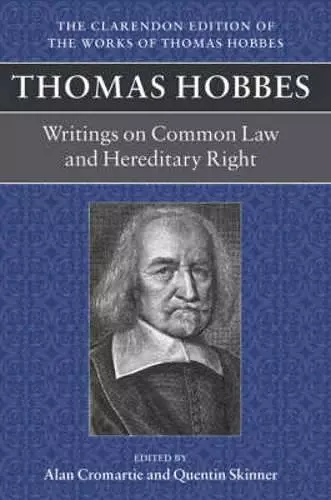Thomas Hobbes: Writings on Common Law and Hereditary Right
A dialogue between a philosopher and a student, of the common Laws of England. Questions relative to Hereditary right
Quentin Skinner editor Alan Cromartie editor
Format:Hardback
Publisher:Oxford University Press
Published:3rd Mar '05
Currently unavailable, and unfortunately no date known when it will be back
This hardback is available in another edition too:
- Paperback£51.00(9780199236237)

This volume in the Clarendon Edition of the Works of Thomas Hobbes contains A dialogue between a philosopher and a student, of the common laws of England, edited by Alan Cromartie, supplemented by the important fragment on the issue of regal succession, 'Questions relative to Hereditary Right', discovered and edited by Quentin Skinner. The former work is the last of Hobbes's major political writings. As a critique of common law by a great philosopher, it should be essential reading for anybody interested in English political thought or legal theory. Although it was written when Hobbes was at least eighty, it is a lively piece of work that goes beyond a recapitulation of earlier Hobbesian doctrines, not least in applying his central ideas to the details of the English constitution. This edition supplies the extensive annotation on matters of legal and historical detail that is required by non-specialist readers; it also assists students by offering cross-references to other treatises. Cromartie's introduction is an authoritative account of seventeenth-century thinking about the common law and of Hobbes's shifting attitudes towards it. It has often been suspected that the book was motivated by fear of being burned for heresy. Cromartie disentangles the complex evidence (scattered across a number of late works) that documents this fear's development, and shows why the philosopher's acute anxieties eventually led him to write a legal treatise. In clarifying these questions, the edition casts fresh light upon his attitude to law and sovereignty. The second piece takes the form of a question put to Hobbes about the right of succession under hereditary monarchies, together with Hobbes's response. The question is in the handwriting of the fourth Earl of Devonshire, the son of the third Earl, whom Hobbes had tutored in the 1630s. He asks Hobbes whether an heir can be excluded if he is incapable of protecting his prospective subjects. The question of 'exclusion' became the most burning issue in English politics in the course of 1679, when a bill to exclude the future James II was introduced into the House of Commons. Hobbes answers with a robust defence of hereditary right, in the course of which he also makes some important general observations about the concept of a right. The manuscript is also of special interest as it constitutes Hobbes's last word on politics. It was almost certainly written in the summer of 1679, less than six months before Hobbes's death.
Cromartie's careful and erudite edition is matched by an introduction which discusses Hobbes writings on jurisprudence and the nature of common law. . . . Cromartie's labors establish, with precision, that Hobbes continued to believe that his writings were relevant for contemporary political debates. Indeed, the fragment which Skinner has edited with exemplary and forensic application reinforces the notion that, right up until the last moments of his very long life, Hobbes deliberately reflected on current political affairs. * Justin Champion, Journal of Early Modern History *
We are greatly in Cromartie's and Skinner's debts for the quality of their editing work on these texts and their historically rich introductions that supply the intellectual, political, and personal context for their composition. * Mark Murphy, Notre Dame Philosophical Reviews *
ISBN: 9780198237020
Dimensions: 240mm x 160mm x 22mm
Weight: 558g
264 pages